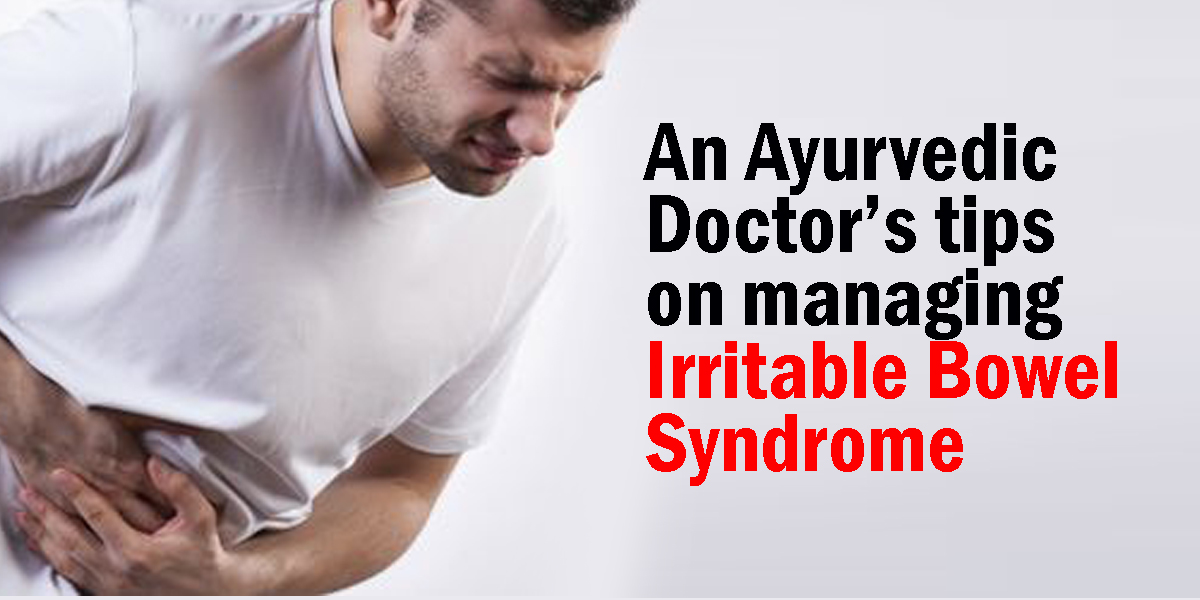Irritable Bowel Syndrome is a gastrointestinal disorder that triggers changes in the digestive system. It can result in cramping, pain, gas, bloating and change in bowel habits. In this blog, I bring you simple natural tips that to make your Irritable Bowel Syndrome treatment more effective.
There are several types of IBS, all of them begins in the gut!
IBS with diarrhoea is characterized by chronic or recurrent diarrhoea. IBS with constipation causes abdominal pain. Some people may also experience alternating symptoms of diarrhoea or constipation.
Also Read: Ayurvedic Treatment for Constipation
In modern medicine, there is no known cure for this condition. They offer treatment options that ease the pressing symptoms. But medicines alone is not enough for Irritable Bowel Syndrome treatment.
However, Ayurveda has a better insights on Irritable Bowel Syndrome treatment. The 5000-year-old science of natural healing emphasizes on the importance of gut health.
Also Read: Simple Ayurvedic Treatment for Irritable Bowel Syndrome
Things that messes up your gut
- Firstly, excess of Antibiotics and other medications harm your gut.
- Secondly, Refined carbohydrates, sugar and processed foods are also harmful.
- Thirdly, if you eating a diet low in fibres then that can cause IBS.
- Above all, Stress is a big curser.
- Finally, Infections of the gut can also trigger IBS.
Symptoms of IBS
The signs and symptoms of IBS vary from person to person. However, there are a few symptoms that come up more often:
- Abdominal pain
- Changes in bowel habits
- Gas problems
- Bloating
- Cramping and Pain
- Discomfort
- Weight loss
- Loss of appetite
Causes of IBS
Irritable Bowel Syndrome can be caused by several factors. From food choices to genetics, many things can play a role. But the most common causes of IBS are abnormal movements of the colon.
Psychological conditions like anxiety or depression can also trigger IBS. It can also be caused by small intestinal bacterial overgrowth (SIBO). Above all, IBS is predominantly caused by lifestyle and diet disorder.
6 Triggers of IBS
Irritable Bowel Syndrome can get worse by certain triggers. Things like stress, anxiety and depression can worsen the condition. Certain foods can also cause an adverse reaction. But it varies from person to person.
Here are some of the common triggers that most patients complain of –
- Caffeine – Caffeine can cause abdominal discomfort. It’s important to pay attention to the body’s reaction to caffeine.
- Water – Dehydration can worsen the condition. It is very important to drink enough water to ease constipation or diarrhoea.
- Fibre – Lack of fibre in the diet can also worsen constipation and bloating.
- Dairy – Lactose intolerance can be a trigger for IBS. Switching dairy with alternate sources like almond, soy or coconut milk is a good option.
- Stress – Psychological issues like stress, anxiety and depression can worsen the issues. More than half of IBS sufferers have underlying anxiety or stress.
- Smoking – In some people, smoking can worsen IBS symptoms.
Foods to eat
- Dietary fibre.
- Water.
- Low-fat foods.
- High-carbohydrate foods.
- Probiotics and prebiotics.
- Aloe vera juice.
Foods to avoid
- Dairy products, including milk and cheese.
- Certain vegetables and legumes
- Fatty or fried foods
- Alcohol, caffeine, or soda
- Foods high in sugars
- Artificial sweeteners
- Chewing gum
- Nuts
- Seeds
- Spices
Ayurvedic Tips for Irritable Bowel Syndrome treatment
Ayurveda elucidated the relationship between body, mind and spirit thousands of years ago. It highlights the role of diet, exercise, lifestyle on our health and well-being. Ayurvedic doctors teach relaxation techniques and prescribe herbal remedies that help bring balance to the body and mind.
Ayurvedic Treatment for IBS
According to Ayurveda, IBS is a functional disorder of Agni. IBS is a result of the imbalance of the doshas. Thus, Ayurveda focuses on balancing the doshas to restore health. Ayurveda suggests the following tips to treat IBS:
- Langhana or fasting
- Deepana or carminatives
- Pachana or digestives
- Sangrahi or intestinal restoratives
- Ksut (withstanding hunger/ avoidance of food)
- Trit (withstanding thirst)
- Vyayama (physical activity)
- Atapa (exposure to sunlight)
- Maruta (exposure to breeze)
General Diet and Lifestyle Guidelines
- Eat light and freshly cooked food only when you are hungry.
- Avoid long intervals between two meals and do not binge in-between times.
- Herbs good for you are ginger, black pepper, cayenne pepper, cinnamon and long pepper.
- Occasional fasting and a mono-diet (Kitchari)
- Eat fresh fibrous fruits and vegetables to cleanse the digestive system.
- Split green gram, bitter gourd, pumpkin, pomegranate, Indian gooseberry, mint leaves, turmeric, coriander, cumin seeds, rock salt, cow ghee, fresh buttermilk helps prevent GI diseases.
- Lukewarm water after meals aids in proper digestion.
- Physical activity for 15-20 minutes aids in the digestion of food.
- Foods with cold, wet and heavy qualities should be avoided.


5 comments
More than sufficient info about IBS in one go!. Diagnosing early by a doctor is very important – like you did in my case, which was due to stress.
Thank you Doctor.
you are welcome sir
generic sildenafil india – sildepl.com canadian sildenafil
That is a great tip particularly to those new to the blogosphere. Simple but very precise infoÖ Appreciate your sharing this one. A must read article!
Thank you ever so for you article post.Thanks Again. Awesome.